
The O. D. Butler, Jr. Animal Science Complex on Thursday, Aug 21, 2025 in College Station, Texas. (Hannah Harrison/Texas A&M AgriLife)
Welcome to our final post of the year. Today, we will review the economic topics that garnered the most attention in 2025 and discuss some of the challenges we anticipate in the upcoming year. Enjoy this Holiday Season, and see you all next year! [Read more…] about Looking Back on 2025: A Year in Review



 On July 4, 2025, President Trump signed the One Big Beautiful Bill Act (OBBBA) into law. The law included changes to the Agriculture Risk Coverage (ARC) and Price Loss Coverage (PLC) programs. In a previous post, we covered what changed for the PLC program. This post explains what has changed for the ARC program and how payments under these programs might be affected.
On July 4, 2025, President Trump signed the One Big Beautiful Bill Act (OBBBA) into law. The law included changes to the Agriculture Risk Coverage (ARC) and Price Loss Coverage (PLC) programs. In a previous post, we covered what changed for the PLC program. This post explains what has changed for the ARC program and how payments under these programs might be affected. 


